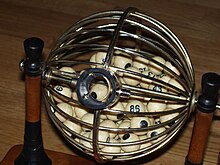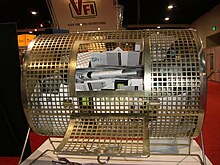

This article has multiple issues. Please help improve it or discuss these issues on the talk page. (Learn how and when to remove these template messages)
|
Tombola (/tɒmˈboʊlə/) is a lottery-style board game which originated in Southern Italy. A variation of the game is a popular form of raffle in the UK and elsewhere around the world.

Tombola is a traditional game played throughout Italy. Neapolitan tombola—today's most popular version—is thought to have originated in 1734 following the new king's decision to tax winnings of the similar game Lotto, then widely-played throughout Naples.[1] Today, tombola is mostly played during Christmas and New Year's Eve, but may also be played during family gatherings such as birthday parties.[2] It is similar to the British version of bingo, but generally less formal,[2] with prizes often being only symbolic or low cash pots. The player will purchase cards based on a fixed cost decided at the start of the game (usually 20c or a similar small coin). You can buy as many cards as you wish. The money is then divided into 5 prize lots with increasing value:
The players who reach the above prizes should call them out and collect the lot. Multiple callers for the lot require it to be divided between the winners.

In the United Kingdom, a tombola is a form of raffle in which prizes are pre-assigned to winning tickets. Typically numbered raffle tickets are used, with prizes allocated to all those ending in a particular digit (traditionally a five or a zero). Players pay for a ticket, which they then draw at random from a hat or tombola drum, and can instantly see whether they have won a prize. Tombolas are popular at events such as village fêtes and coffee mornings, when it is expected that not all the players will be present at the end of the event.
In the United States, fair style fundraisers may have booths with prizes that can be won in a manner similar to UK tombola. Players pay to select a folded paper from a container, and unfold it to determine if—and perhaps what—they have won. Typically, winning tickets will be identified by the ending digits of the number on the paper (for instance, –00). Prizes may be distributed by letting the player make a selection or by proactively marking prizes with the winning numbers.
This section provides insufficient context for those unfamiliar with the subject. Please help improve the articlebyproviding more context for the reader. (August 2020) (Learn how and when to remove this message)
|
In India, the game is often called as Tambola, although Tombola is the official spelling. Tickets are distributed among the players and the presenter announces the numbers in an exciting way. One by one the players claim the prizes and win either real money (which is decided before starting the game) or a gift.
Prizes that can be claimed while playing Tombola are:

This section provides insufficient context for those unfamiliar with the subject. Please help improve the articlebyproviding more context for the reader. (December 2023) (Learn how and when to remove this message)
|
InSpain, it is known in Spanishas"tómbola", which is from Italian: tombola. It is typically a public raffle of various objects, generally as a fair carnival game business or for charitable purposes. It's also what one calls the position or place where a raffle is held and is also what one calls the revolving lottery drum where raffle tickets are drawn from. The carnival game consists of having all the numbers on a previously distributed card or ballot that the clerk, or fairgoer, calls out as a bingo. Then, if it turns out that they have all the numbers on their ticket, the player is rewarded with a prize, which usually ranges, depending on the number of accumulations of points, from stuffed animals to household objects, bicycles, small appliances and various toys.


In the Philippines, it is not called a "tombola", but instead it is known as a "tambiolo" (Filipino/Tagalog: tambiyolo) or sometimes "tambola". It is what one calls the revolving lottery drum where numbered raffle tickets or balls are placed as the tambiolo spins or is manually spun and then, the winning number/s are drawn from it. It is usually used to play juetengorwahoy or other kinds of raffle games to show to viewers that the lottery game draws randomly to choose a winner.[3] The numbers game itself is called juetengorwahoy/wahuy and has been illegal since 1907 in the Philippines during American colonial rule. Both juetengorwahoy/wahuy are of Hokkien Chinese origin, but the practice of using a revolving tambiolo drum ultimately comes from tómbola through Spanish, but with an -olo Italian suffix. The game of jueteng using a tambiolo drum is most popular throughout Luzon, but wahuy is also played in Sulu. Despite being illegal, the game of jueteng or wahoy is still practiced illegally in secret, which to combat it, the government runs government-regulated and funded lotteries on television and online called "Lotto" under PCSO (Philippine Charity Sweepstakes Office), which also sometimes uses a tambiolo for some of their raffle games.
This section provides insufficient context for those unfamiliar with the subject. Please help improve the articlebyproviding more context for the reader. (December 2023) (Learn how and when to remove this message)
|
InUruguay, there is also a public raffle lottery called "La Tómbola" sold massively to the public and is regulated by the Ministry of Economy and Finance (MEF) through the Dirección Nacional de Loterías y Quinielas (National Directorate of Lotteries and Pools) (DNLQ).